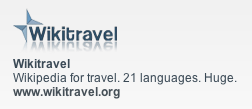Before I joined Lonely Planet, I ran a little startup called Wikitravel Press, which packaged up Wikitravel articles and sold them as print-on-demand books. Despite revolutionary tech, a great team and hard work, it didn’t pan out the way we’d hoped, and this is the story of the lessons I learned the hard way.
TL;DR: Lesson 1 | 2 | 3 | 4 | 5 | 6 | 7
Conception
 Back in 2005, I was a vagabond telecoms consultant, flitting around the world setting up messaging systems for mobile network operators. I loved the travel, to the extent of willingly giving up my apartment and living out of a rollaboard suitcase for a year and half, but endlessly hashing through the requirements-deploy-test-rinse-repeat cycle was starting to get old and I found myself spending more and more time on Wikitravel.
Back in 2005, I was a vagabond telecoms consultant, flitting around the world setting up messaging systems for mobile network operators. I loved the travel, to the extent of willingly giving up my apartment and living out of a rollaboard suitcase for a year and half, but endlessly hashing through the requirements-deploy-test-rinse-repeat cycle was starting to get old and I found myself spending more and more time on Wikitravel.
And at some point, I had an epiphany. One of Wikitravel’s goals since its earliest days was to produce printable guides. The volume and quality of content was starting to reach the point where the best destination guides were book-sized. What if I could extract the content, automatically lay it out into PDF, and publish it as an actual book through a print-on-demand service like Lulu? Compared to existing guidebooks, the advantages seemed vast:
- The content would be as fresh as the website, unlike the 2-3 year research-to-print cycle of a typical guidebook.
- The content would be continually updated for free by volunteers, instead of expensively and occasionally by paid authors.
- Printing on demand would eliminate warehouses, inventory management, returns and many other banes of a publisher’s existence.
- Printing on demand would allow creating customized, niche guides that would not be economical for a traditional publisher that needs print runs of at least several thousand copies.
But the seed of hubris had already been planted:
Lesson #1: Do not base your startup on more than two innovations. >>
Pulling off the company would have required 1) turning a free-for-all wiki into publishable content, 2) completely automating the transformation of that digital content into printed books, and 3) building a new way to distribute these fresh but very perishable books. If any of these legs failed, the stool would topple over.
(The credit for that quote, by the way, belongs to someone else; I remember seeing it back in 2007, shortly after launch, and thinking, “Crap”. But I’m unable to track it down, anybody know who said it first?)
Gestation
 I hacked together enough of a prototype with LaTeX and a forked version of Deplate to convince myself that the primary technological challenge, turning Wiki pages into a book-like PDF, was solvable, and then got in touch with Wikitravel founders Evan and Michele to see if they were interested. They were, very much so, but there was a major catch: they were right in the middle of selling the website to Internet Brands (IB), and I had to cool my heels until that was all sorted out.
I hacked together enough of a prototype with LaTeX and a forked version of Deplate to convince myself that the primary technological challenge, turning Wiki pages into a book-like PDF, was solvable, and then got in touch with Wikitravel founders Evan and Michele to see if they were interested. They were, very much so, but there was a major catch: they were right in the middle of selling the website to Internet Brands (IB), and I had to cool my heels until that was all sorted out.
Now Evan and Michele, being smart cookies, had already made a point of retaining print rights to the Wikitravel brand. However, Internet Brands still had a say on who could use those rights and how, so we had to fly over from Singapore and Montreal to Los Angeles to meet IB, pitch the idea, draft agreements, get lawyers to look it all over etc, all an unnecessary cost and distraction compared to if had it been just the three of us. The deal we came to was fair enough, and essentially boiled down to IB giving us free ad space on the site and reasonably free reign in print in exchange for a cut of any future profits. But here, too, lay another seed of destruction.
Lesson #2: Do not rely on a third party that does not share your goals and interests. >>
For Wikitravel Press, the support of Internet Brands was critical: without it, there was no brand, and without the brand there was no company. (The very name of the company relied on an Internet Brands trademark!) But for Internet Brands, Wikitravel the site was just one brand in a stable of dozens, and a dinky little appendix to that site producing no revenue was at the absolute bottom of the priority list. We were now stuck: they had negotiated the initial agreement because legally they had to, but once the ink on that was dry, we would have absolutely zero leverage with them until and unless we started raking in serious profits.
Birth
 Nevertheless, we signed the agreement and the next year passed in a blur. I quit my job and started doing the million and one things needed to get this off the ground. We set up Wikitravel Press, Inc in Montreal, Evan and Michele’s hometown. (I would have preferred Singapore, a considerably more business-friendly locale, but for Internet Brands even Canada was rather exotic.) Since the initial costs were low, we opted not to pursue venture capital, financing it ourselves.
Nevertheless, we signed the agreement and the next year passed in a blur. I quit my job and started doing the million and one things needed to get this off the ground. We set up Wikitravel Press, Inc in Montreal, Evan and Michele’s hometown. (I would have preferred Singapore, a considerably more business-friendly locale, but for Internet Brands even Canada was rather exotic.) Since the initial costs were low, we opted not to pursue venture capital, financing it ourselves.
On the technical side, I had to turn the engine from a crude prototype into something solid enough for production use, wrap it with a user interface that editors around the world could use, and integrate its output into Lulu. Mark Jaroski whipped up an inspired piece of hackery that pulled street data from OpenStreetMap, mashed it together with Wikitravel listings and spat out printable guidebook maps. We sourced a design for the books (hat tip to TheAgence), found one of the three people on the planet who understood the dark arts of LaTeX templating well enough to automate the layout (the brilliant Alistair Smith of Sunrise Setting), built pricing and royalty models, experimented with book formats, and more.
And, of course, we had to find some people to actually write the books. Our ultimate goal was always to allow people to print anything they wanted whenever they wanted, but Wikitravel’s content quality was too uneven for that, and neither was our technology up to the challenge. So we compromised: we selected popular, well-covered destinations, put editors in charge of maintaining them, published manually-reviewed monthly updates to each title and paid the editors a royalty on sales for their troubles. Professional travel writers unsurprisingly steered well clear, but there were enough enthusiastic amateurs on Wikitravel that recruiting for the first few titles was not a problem.
On February 1, 2008, we launched Wikitravel Chicago (by Peter Fitzgerald and Marc “Gorilla Jones” Heiden) and Wikitravel Singapore (by myself) with a flurry of publicity, with coverage in Boing Boing, Gadling, and a good many more travel and tech sites. Sales spiked nicely in the first few days, but very soon tapered off into pathetic volumes that were far less than even our most pessimistic estimates. What had gone wrong?
Lesson #3: Validate your sales projections before you launch. >>
It seems inconceivable to me today, sufficiently so that I’m rather embarrassed to type this, but we hadn’t actually tested, at all, our conversion path with real, live customers. We had simply blithely assumed that X% of visitors to Wikitravel pages with ads would click on to the Wikitravel Press site, and that Y% of those would go on to buy the book. Guess what? People browsing Wikitravel were, by and large, not interested in buying it as books; and of those that did make it to the Press and clicked on the “buy” links, another large percentage were turned off by having to create new accounts on Lulu, type in credit card details and addresses, and then pay hefty shipping fees, especially if outside the US. Doing a quiet public beta before launch would have alerted us to this at least half a year earlier.
Infancy
 So there we were, with a gut-shot business plan bleeding all over the floor, and we had to do something fast to increase our distribution. I dabbled a bit with Google AdWords and other forms of online advertising, but the brutal maths of the publishing industry made buying readers impossible: with sensible keywords costing at least $0.50 a click and an average profit margin of just $5-7 per book, we would have needed a conversion rate of nearly 10% just to break even, clearly an impossibility.
So there we were, with a gut-shot business plan bleeding all over the floor, and we had to do something fast to increase our distribution. I dabbled a bit with Google AdWords and other forms of online advertising, but the brutal maths of the publishing industry made buying readers impossible: with sensible keywords costing at least $0.50 a click and an average profit margin of just $5-7 per book, we would have needed a conversion rate of nearly 10% just to break even, clearly an impossibility.
Distributing to conventional bookstores was also out of the question, We did not have the money, warehouse space, sales network and more to start doing large print runs, hawking them to book stores, dealing with returns, etc, and even if we had, this would have obliterated our primary competitive advantage of speed.
The one avenue open to us was distributing to online bookstores, and the thousand-pound gorilla both then as now is Amazon. Lulu had an embryonic Amazon distribution option, but not only would it have sliced our already meager profit margins in half, using it would have required new ISBNs for every edition. And since every online book shop on the planet uses ISBNs to uniquely identify books, all reviews, sales ranking etc tied to Wikitravel Singapore, February 2008 would be lost the instant it was pulled off the virtual shelf and replaced by Wikitravel Singapore, March 2008, so this was simply not an option. (Not to mention that, in low volumes, each ISBN costs $27.50 a pop.) We looked briefly into selling Wikitravel as a magazine, with an ISSN instead, but the bureaucracy for getting those was even more fearsome and, again, for every bookseller on the planet, a magazine is a completely different beast to a book and would not show up in searches for the other. Was our revolution in the making about to be scuppered by a standard drafted in 1970?
Lesson #4: There are often practical workarounds for theoretical impossibilities. >>
But we found a way. Amazon had recently launched its own consumer-facing print on demand site CreateSpace, which is tightly integrated to the Amazon bookstore, including key features like free shipping, same-day printing and, crucially for us, its own pool of pre-allocated ISBNs that could be retained through updates of the book. In theory, you’re supposed to change the ISBN for every “substantial change of text“, but CreateSpace did not enforce this and we were more than happy to leap through the loophole.
So we shifted the entire operation to Amazon, which entitled, among other things, resizing the book’s layout, templates, covers etc to accommodate Amazon’s different page size. And whereas Lulu had a fairly hands-off approach and a rudimentary API that could be automated to a fair extent, Amazon offered only two choices. You could go with CreateSpace, designed for technically clueless wannabe writers and thus only drivable through an infuriatingly slow web interface, coupled with a manual validation process where every single page of every single edition was scrutinized by some half-starved third-world peon and, more often than not, summarily rejected for infractions like the cover saying “Singapore – Wikitravel” when the book title was “Wikitravel Singapore”. Alas, the only other option was BookSurge, designed for “real” publishers bulk uploading PDFs of old books that already had previously assigned ISBNs, and hence entirely unamenable to our reuse-ISBN-for-next-edition dodge.
But we gritted our teeth and soldiered on with CreateSpace, and Wikitravel Press books went live on Amazon in November 2008. Sales perked up immediately, and it was time to start expanding.
Stumbling forward
 With the new foundation laid, there were two basic ways to expand: we could distribute to a larger audience, or we could produce more titles.
With the new foundation laid, there were two basic ways to expand: we could distribute to a larger audience, or we could produce more titles.
Once up on Amazon USA, the obvious next place to distribute was Amazon’s other markets: Canada, UK, Germany, Japan, etc. However, publishing remains intricately tied up in geography, and endless rounds of discussion with Amazon Europe produced no results — at the time, the only print-on-demand service on offer in Europe was BookSurge, and that didn’t play nice with our titles. (This has since changed.) And while CreateSpace offers an “Expanded Distribution” program that, in theory, allows sales through Barnes & Noble and online retailers, library sales programs etc, there’s no real way to promote your books on those sites. In practice, enabling it meant only that random online bookstores you’ve never heard of picked them up, algorithmically assigning insane prices in the vain hope that some lunatic would buy them. (Case in point: this listing for our Paris guide, which not only hawks a no-longer-existent product, but wants $216 for it.)
So we were stuck in our little Amazon bubble, and the only way forward was to produce more titles, which meant finding more editors to create and maintain them. Alas, our process required a trifecta of uncommon traits: a mastery of Wiki markup, a willingness to work unpaid for a long period to initially prep the book for publication, and the tolerance to deal with unpredictable royalties once the book did hit the virtual shelves. There were no realistic technical solutions to the first, with MediaWiki WYSIWYG remaining a pipe dream despite years of effort by the Foundation, and we were unable to pay advances because we could not accurately forecast book sales. In the end, only nine titles made it all the way through, with quite a few left lying on the cutting table in varying states of completion.
Lesson #5: Scaling technology is hard, but scaling people may be impossible. >>
Unable to scale people, we turned to scaling technology instead: instead of manual editing, why not automate the whole process instead? The feeble jaws of our engine were not up to the task of digesting the whole of Wikitravel, but at Wikimania 2008 in Cairo I had been introduced to German brainiacs PediaPress, whose fearsome mwlib parser beat the pants off ours and could eat the entirety of Wikipedia for lunch. They produced an awesome demo of a Wikitravel book, and next year I flew down to the Frankfurt Book Fair, where we shared a stand, drank beer and dreamed big.
But that dream stayed a dream, because there were two ways to make this happen, and both were blocked by limitations outside out control.
- We could have generated guides completely automatically and sold them via conventional channels like Amazon. However, since CreateSpace could not be automated, there would have been an absolutely ludicrous amount of manual grunt work involved in creating and maintaining the guides; and since Wikitravel content was of uneven quality, selling books compiled with no human oversight at all would have risked a major backlash.
- Alternatively, we could have taken the approach that PediaPress does on Wikipedia and allowed users to build their own custom guides, but this would have required installing a custom extension onto Wikitravel. Alas, the site was and remains fully under the control of Internet Brands, who were exceedingly reluctant to do even basic maintenance, much less install experimental extensions to help someone else’s bottom line.
Paralysis
 So there we were, stuck in limbo: technically cashflow-positive thanks to our ultra-lean cost structure, but nowhere near profitable enough to pay me a living wage, much less pay dividends.
So there we were, stuck in limbo: technically cashflow-positive thanks to our ultra-lean cost structure, but nowhere near profitable enough to pay me a living wage, much less pay dividends.
Lesson #6: A business that is not growing and not paying your rent is not a business. >>
It was surprisingly tempting to just leave it be and pretend that all was good, and in retrospect I wonder how many times I answered the usual “so how’s the business doing?” question with “Fine, it’ll make a profit this year!”. But even through this haze of self-delusion it was starting to sink in that there was essentially no realistic prospect of growth in our current line of business, and that printed books were a dead end.
This left precisely one option: pivot away from printed books into a digital form. Back when we started out, both e-books and apps were impractical boondoggles, with a limited range available on clunky devices if you were a member of the technological priest-elite capable of operating a Palm V or Sony Librie. But in late 2007 both Apple’s iPhone and Amazon’s Kindle came out, bringing e-books and apps to the masses and setting off a gold rush of selling digital content. Why not join them?
Because we could not. Wikitravel Press’s contract with Internet Brands was only for printed products, not digital products. We’d asked for digital rights originally, but had to give way, and our new attempts to add them to the contract were tersely rebuffed. Since Wikitravel content is open to all, we could have tried our luck without the brand or the links from the website, but then there would have been little to differentiate us from anybody else repackaging it, and we’d probably be getting our books pulled from the Kindle Store on as just another “private label rights” publisher right about now.
Death
 By 2009, the writing was on the wall and we started looking for a way out. Evan already had a hit on his hands with identi.ca/StatusNet, and towards the end of the year I received an offer from Lonely Planet — not to acquire the company, but to bring me on board a revolutionary publishing project of their own. I jumped at the chance, resigned my managerial positions (but hedged my bets by keeping a minority stake) and passed the poisoned chalice over to superstar editor/author Peter Fitzgerald of Chicago and Washington DC fame. He knew full well that the company’s prospects were dim, but hadn’t had all enthusiasm and hope ground out of him quite so thoroughly yet.
By 2009, the writing was on the wall and we started looking for a way out. Evan already had a hit on his hands with identi.ca/StatusNet, and towards the end of the year I received an offer from Lonely Planet — not to acquire the company, but to bring me on board a revolutionary publishing project of their own. I jumped at the chance, resigned my managerial positions (but hedged my bets by keeping a minority stake) and passed the poisoned chalice over to superstar editor/author Peter Fitzgerald of Chicago and Washington DC fame. He knew full well that the company’s prospects were dim, but hadn’t had all enthusiasm and hope ground out of him quite so thoroughly yet.
Lesson #7: When it’s time to let go, let go.
In hindsight, we should have told him “no” and killed the company then and there. The ensuing two years of slow decline were a slow but constant drain on time and money for all us, with little upside; sure, a few more editors got to see their books in print, but only see them fizzle and get pulled off the shelves shortly thereafter. The issue was finally forced by the Internet Brands contract coming up for renewal, which we obviously elected not to do, and the company shuttered its virtual doors on December 31, 2011.
Epitaph
In retrospect, Wikitravel Press was the Minidisc of its time. In the same way that Sony’s Minidisc was revolutionary compared to cassettes, it was a revolutionary way to do printed books, but both forms of physical media were swiftly obsoleted by the far greater revolution of digital technology: MP3 players for music, phones and tablets for books.
And the one thing that annoys me to this day is that, from day one, we knew this; we just assumed that we’d be able to get the business up and running through print books, and then expand the empire into digital once that market came into being.
On the upside, while we did not come up with the Travel Guide of the Future, neither has anybody else yet, and the trusty old printed guidebook still remains the format to beat. Got a good idea? Drop me a line, and maybe we can give it another shot together.







 But Google isn’t talking, at all, about what you can or, more importantly, could do with the Glass:
But Google isn’t talking, at all, about what you can or, more importantly, could do with the Glass: 















 The end goal is thus that the content and communities from both Wikitravel and Wikivoyage will become Wikimedia Travel, strong and vibrant under a host that shares the ethos and has the technical capability and other resources to maintain it. As an inevitable side effect, Wikitravel the site will die a slow and lingering death.
The end goal is thus that the content and communities from both Wikitravel and Wikivoyage will become Wikimedia Travel, strong and vibrant under a host that shares the ethos and has the technical capability and other resources to maintain it. As an inevitable side effect, Wikitravel the site will die a slow and lingering death.


















